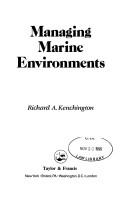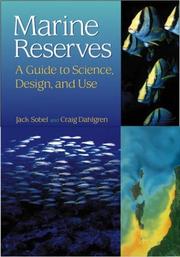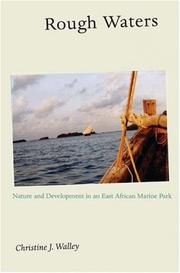| Listing 1 - 10 of 10 |
Sort by
|
Book
ISBN: 9781844077625 9781844077632 Year: 2011 Publisher: Washington, DC : Earthscan,
Abstract | Keywords | Export | Availability | Bookmark
 Loading...
Loading...Choose an application
- Reference Manager
- EndNote
- RefWorks (Direct export to RefWorks)
Cetacea --- Marine parks and reserves. --- Conservation. --- Habitat.

ISBN: 0844816353 Year: 1990 Publisher: New York (N.Y.) : Taylor and Francis,
Abstract | Keywords | Export | Availability | Bookmark
 Loading...
Loading...Choose an application
- Reference Manager
- EndNote
- RefWorks (Direct export to RefWorks)
Marine parks and reserves --- Marine resources conservation --- Marine resources conservation. --- Management --- Case studies. --- Management.
Book
ISBN: 9781844076635 9780203126295 9781136455230 9781136455186 9781136455223 9781138679238 1844076636 Year: 2014 Publisher: New York: Routledge,
Abstract | Keywords | Export | Availability | Bookmark
 Loading...
Loading...Choose an application
- Reference Manager
- EndNote
- RefWorks (Direct export to RefWorks)
"In this challenging volume, the author addresses some key challenges related to the effective and equitable governance of marine protected areas (MPAs). These challenges are explored through a study of 20 MPA case studies from around the world. A novel governance analysis framework is employed to address some key questions: How can top-down and bottom-up approaches to MPA governance be combined? What does this mean, in reality, in different contexts? How can we develop and implement governance approaches that are both effective in achieving conservation objectives and equitable in fairly sharing associated costs and benefits? The author explores the many issues that these questions raise, as well as exploring options for addressing them. A key theme is that MPA governance needs to combine people, state and market approaches, rather than being based on one approach and its related ideals. Building on a critique of the governance analysis framework developed for common-pool resources, the author puts forward a more holistic and less prescriptive framework for deconstructing and analyzing the governance of MPAs. This interdisciplinary analysis is aimed at supporting the development of MPA governance approaches that build social-ecological resilience through both institutional and biological diversity. It will also make a significant contribution to wider debates on natural resource governance, as it poses some critical questions for contemporary approaches to related research and offers an alternative theoretical and empirical approach"-- "In this challenging volume, the author addresses some key challenges related to the effective and equitable governance of marine protected areas (MPAs). These challenges are explored through a study of 20 MPA case studies from around the world. A novel governance analysis framework is employed to address some key questions: How can top-down and bottom-up approaches to MPA governance be combined? What does this mean, in reality, in different contexts? How can we develop and implement governance approaches that are both effective in achieving conservation objectives and equitable in fairly sharing associated costs and benefits? The author explores the many issues that these questions raise, as well as exploring options for addressing them. A key theme is that MPA governance needs to combine people, state and market approaches, rather than being based on one approach and its related ideals. Building on a critique of the governance analysis framework developed for common-pool resources, the author puts forward a more holistic and less prescriptive framework for deconstructing and analyzing the governance of MPAs. This interdisciplinary analysis is aimed at supporting the development of MPA governance approaches that build social-ecological resilience through both institutional and biological diversity. It will also make a significant contribution to wider debates on natural resource governance, as it poses some critical questions for contemporary approaches to related research and offers an alternative theoretical and empirical approach"--
Marine parks and reserves --- Marine biodiversity conservation --- Environmental policy --- Environmental protection --- Government policy --- Environmental policy. --- Environmental protection. --- Science --- Government policy. --- Life Sciences --- Biology --- Marine Biology. --- Marine parks and reserves - Government policy --- Marine biodiversity conservation - Government policy
Book
ISBN: 9789046602164 Year: 2008 Publisher: Antwerpen Apeldoorn Maklu
Abstract | Keywords | Export | Availability | Bookmark
 Loading...
Loading...Choose an application
- Reference Manager
- EndNote
- RefWorks (Direct export to RefWorks)
Law of nations: objects and subjects --- Environmental law --- Belgium --- North Sea Coast (Belgium) --- Marine parks and reserves --- North sea
Book
ISBN: 0081026994 0081026986 9780081026991 9780081026984 Year: 2020 Publisher: Amsterdam, Netherlands ; Oxford, England ; Cambridge, Massachusetts : Elsevier,
Abstract | Keywords | Export | Availability | Bookmark
 Loading...
Loading...Choose an application
- Reference Manager
- EndNote
- RefWorks (Direct export to RefWorks)

ISBN: 1597262536 1597268992 1423765532 9781597268998 9781423765530 9781597262538 1559638400 9781559638401 1559638419 9781559638418 1559635207 Year: 2004 Publisher: Washington, D.C. Island Press
Abstract | Keywords | Export | Availability | Bookmark
 Loading...
Loading...Choose an application
- Reference Manager
- EndNote
- RefWorks (Direct export to RefWorks)
Book
ISBN: 9789046601747 Year: 2008 Publisher: Antwerpen Maklu
Abstract | Keywords | Export | Availability | Bookmark
 Loading...
Loading...Choose an application
- Reference Manager
- EndNote
- RefWorks (Direct export to RefWorks)
Dit boek is het resultaat van het Vlaamse onderzoek uitgevoerd in het project COREPOINT (Coastal Research and Policy Integration) in het kader van INTERREG IIIB North-West Europe. Het bevat een grondige wetenschappelijke analyse van twee beleidsprocessen: de afbakening van de mariene beschermde gebieden in België en de opmaak van het Provinciaal Ruimtelijk Uitvoeringsplan Strand en Dijk. Het boek analyseert telkens het wettelijke kader en de concrete toepassing ervan.De centrale onderzoeksvraag is de wijze waarop de beleidsprocessen verlopen en welke rol participatie hierbij speelt. Om deze vraag te beantwoorden, werkten de onderzoekers met literatuurstudie, documentenanalyse en een reeks diepte-interviews met vertegenwoordigers uit overheid (politiek en ambtelijk), middenveld en markt. In de beschrijving van de beleidsprocessen gaat zowel aandacht naar de rol van actoren en coalities (netwerken), de verdeling van macht, de vigerende spelregels als de gehanteerde beleidsdiscoursen
Law of nations: objects and subjects --- Environmental law --- Belgium --- Milieu --- Milieubeleid --- Marine parks and reserves --- Law and legislation --- Conservation areas, Marine --- Marine conservation areas --- Marine protected areas --- Marine reserves --- Marine sanctuaries --- MPAs (Marine protected areas) --- Sanctuaries, Marine --- Aquatic parks and reserves --- North Sea Coast (Belgium) --- North sea

ISBN: 1282531697 9786612531699 1400835755 9781400835751 0691115591 0691115605 9780691115597 0691115591 9780691115603 0691115605 9781282531697 661253169X Year: 2004 Publisher: Princeton Princeton University Press
Abstract | Keywords | Export | Availability | Bookmark
 Loading...
Loading...Choose an application
- Reference Manager
- EndNote
- RefWorks (Direct export to RefWorks)
Rough Waters explores one of the most crucial problems of the contemporary era--struggles over access to, and use of, the environment. It combines insights from anthropology, history, and environmental studies, mounting an interdisciplinary challenge to contemporary accounts of "globalization." The book focuses on The Mafia Island Marine Park, a national park in Tanzania that became the center of political conflict during its creation in the mid-1990s. The park, reflecting a new generation of internationally sponsored projects, was designed to encourage environmental conservation as well as development. Rather than excluding residents, as had been common in East Africa's mainland wildlife parks, Mafia Island was intended to represent a new type of national park that would encourage the participation of area residents and incorporate their ideas. While the park had been described in the project's general management plan as "for the people and by the people," residents remained excluded from the most basic decisions made about the park. The book details the day-to-day tensions and alliances that arose among Mafia residents, Tanzanian government officials, and representatives of international organizations, as each group attempted to control and define the park. Walley's analysis argues that a technocentric approach to conservation and development can work to the detriment of both poorer people and the environment. It further suggests that the concept of the global may be inadequate for understanding this and other social dramas in the contemporary world.
Economic development projects --- Marine parks and reserves --- Conservation areas, Marine --- Marine conservation areas --- Marine protected areas --- Marine reserves --- Marine sanctuaries --- MPAs (Marine protected areas) --- Sanctuaries, Marine --- Aquatic parks and reserves --- Development projects, Economic --- Projects, Economic development --- Economic assistance --- Technical assistance --- Social aspects. --- Mafia Island Marine Park (Tanzania) --- Social aspects
Book
ISBN: 1281036099 9786611036096 0080551033 9780080551036 9781281036094 9780120444557 1570594236 9781570594236 0120444550 Year: 1997 Publisher: San Diego, Calif., U.S.A. Austin Academic Press R.G. Landes
Abstract | Keywords | Export | Availability | Bookmark
 Loading...
Loading...Choose an application
- Reference Manager
- EndNote
- RefWorks (Direct export to RefWorks)
This book reviews the need for marine conservation, summarizes general measures for ocean and coastal conservation, and explains the rationale for establishing marine protected areas. The second half of the book is essentially a guideline for designing and implementing protected areas in order to make them viable and long-lasting in their effectiveness.
Marine parks and reserves. --- Marine resources conservation. --- Marine biodiversity conservation. --- Conservation of marine biodiversity --- Marine biodiversity --- Marine biological diversity conservation --- Aquatic biodiversity conservation --- Marine resources conservation --- Conservation of marine resources --- Marine conservation --- Marine environmental protection --- Marine protection --- Aquatic resources conservation --- Marine pollution --- Conservation areas, Marine --- Marine conservation areas --- Marine protected areas --- Marine reserves --- Marine sanctuaries --- MPAs (Marine protected areas) --- Sanctuaries, Marine --- Aquatic parks and reserves --- Conservation --- Biological diversity conservation.
Book

ISBN: 270992093X 2709920921 Year: 2016 Publisher: Marseille : IRD Éditions,
Abstract | Keywords | Export | Availability | Bookmark
 Loading...
Loading...Choose an application
- Reference Manager
- EndNote
- RefWorks (Direct export to RefWorks)
Les écosystèmes côtiers, qui concentrent actuellement 70 % de la population mondiale, sont particulièrement impactés par le changement climatique et les activités anthropiques. D’où les espoirs placés dans la création d’aires marines protégées (AMP), qui favorisent la résilience des systèmes vivants et la conservation des espèces. Au cours des dernières années, un véritable consensus international s’est progressivement imposé quant à l’intérêt de les multiplier. Cependant, de nombreuses incertitudes demeurent sur leur efficacité réelle et sur les modalités de leur mise en œuvre. Les enjeux sociétaux qui sont associés à la multiplication des AMP interrogent les scientifiques, notamment en termes d’acceptation sociale, de régulation juridique et de pérennité des dispositifs mis en place. Ainsi, entre soutien au développement des AMP et analyse des controverses dont elles font parfois l’objet, cet ouvrage apporte un éclairage interdisciplinaire sur le développement de ces nouveaux espaces de conservation. Les études présentées ici sont centrées sur l’Afrique du Nord-Ouest (Algérie, Maroc et Sénégal). À travers le regard de juristes, d’écologues, de géographes, d’économistes, elles illustrent le potentiel associé à ce mode de conservation des zones marines et côtières. Elles questionnent par ailleurs l’efficience des AMP, tout en soulignant leur intérêt, bien au-delà des territoires où elles se situent.
Marine ecology --- Coastal ecology --- Marine resources conservation --- Marine parks and reserves --- Biodiversity conservation --- Fishing --- Water resources development --- Environmental aspects --- Energy development --- Natural resources --- Water-supply --- Angling --- Recreational fishing --- Sport fishing --- Sportfishing --- Aquatic sports --- Wildlife-related recreation --- Fishes --- Biodiversity --- Biological diversity conservation --- Conservation of biodiversity --- Diversity conservation, Biological --- Gender mainstreaming in biodiversity conservation --- Maintenance of biological diversity --- Preservation of biological diversity --- Conservation of natural resources --- Ecosystem management --- Conservation areas, Marine --- Marine conservation areas --- Marine protected areas --- Marine reserves --- Marine sanctuaries --- MPAs (Marine protected areas) --- Sanctuaries, Marine --- Aquatic parks and reserves --- Conservation of marine resources --- Marine conservation --- Marine environmental protection --- Marine protection --- Aquatic resources conservation --- Marine pollution --- Coast ecology --- Coastal zone ecology --- Coasts --- Coastal biology --- Ecology --- Sublittoral ecology --- Biological oceanography --- Marine ecosystems --- Ocean --- Aquatic ecology --- Conservation --- pêche --- écosystème --- conservation --- ressource halieutique --- Afrique occidentale
| Listing 1 - 10 of 10 |
Sort by
|

 Search
Search Feedback
Feedback About UniCat
About UniCat  Help
Help News
News